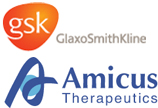 GlaxoSmithKline (GSK) announced today that they and Amicus Therapeutics have began the second phase III study of Amigal by way of dosing in a global registration study (Study 012) in an effort to compare safety and efficacy of Amigal (migalastat HCl) along with enzyme replacement therapy (ERT) for treatment of Fabry disease.
GlaxoSmithKline (GSK) announced today that they and Amicus Therapeutics have began the second phase III study of Amigal by way of dosing in a global registration study (Study 012) in an effort to compare safety and efficacy of Amigal (migalastat HCl) along with enzyme replacement therapy (ERT) for treatment of Fabry disease.
Fabry disease is a rare, inherited lysosomal storage disorder.
The study has a duration of 18 months and is randomized, open-labeled according to GSK. The company said that the 18 month study will provide long-term clinical data for comparing migalastat HCl to ERT in patients with Fabry disease.
In a company statement, John F. Crowley, Chairman and Chief Executive Officer of Amicus, stated, “In collaboration with GSK we are pleased to announce the dosing of the first patient in Study 012, the first Phase III pivotal study to compare Amigal to ERT. This is an important step in our clinical development plan and builds on the latest encouraging safety and renal function data from our ongoing Phase II extension study.”
Also said in a company statement, “We believe Amigal has the potential to provide an important treatment option in Fabry disease,” said Dr. Philippe Monteyne, Head of Development and Chief Medical Officer for GSK Rare Diseases. “We are delighted with the progress that the joint Amicus-GSK team has made to advance the clinical development program since we entered an alliance in October 2010.”
